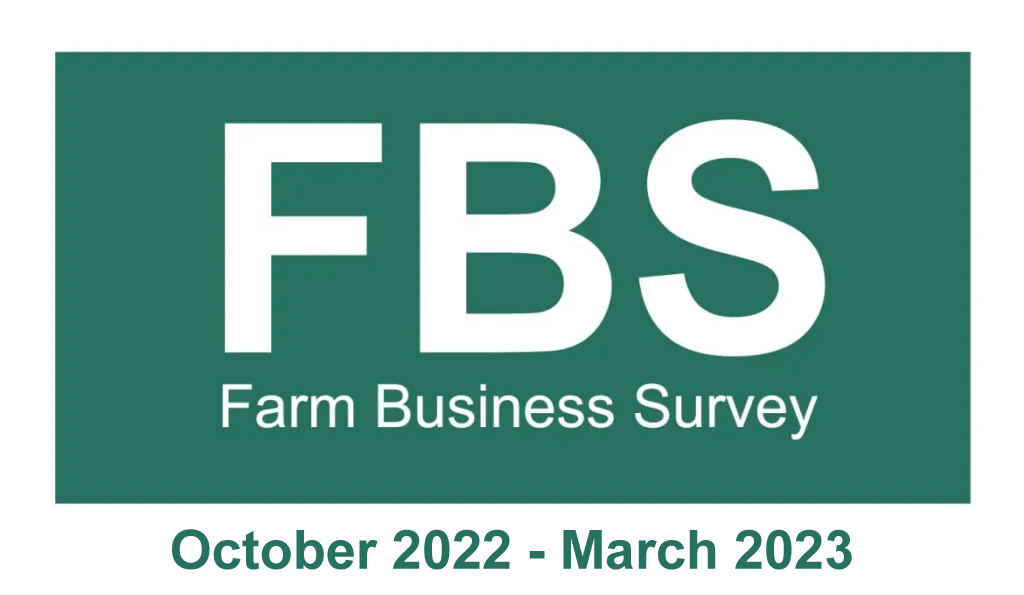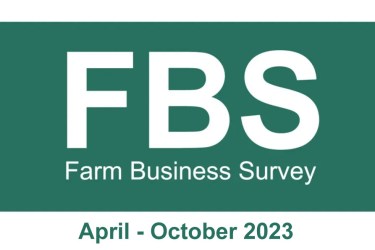As part of our ongoing Farm Business Survey work for Defra, we collect an enormous amount of farming data and intelligence from across all sectors of the industry. We’ve now processed the latest batch of facts and figures, which we gathered during the autumn and winter of 2022-23. Here is a very short summary of the information. You can access the full version at the bottom of this page.
Autumn-winter results
We collected this information collected over a six-month period, from the beginning of October 2022 through to the end of March 2023.
Forage harvest
Across all regions, the summer drought of 2022 affected the forage harvest of hay, silage and maize, resulting in a reduction in fodder available for the winter.
Milk price high, dairy inputs high
UK milk prices were strong (higher than 50p/litre) in the lead up to peak volume season. However, the cost of inputs, including feed, fertiliser, electricity, fuel and borrowing costs, affected margins.
Beef
Beef prices including cull cows were extremely strong despite high cereal prices. Bovine TB (bTB) remains a constant challenge.
Sheep
The store and fat lamb trade returned to lower prices in late autumn. However, cull ewe prices remained strong. The extremely dry summer of 2022 negatively impacted on ewe quality and adversely affected fertility at tupping, resulting in reduced scanning and lambing rates.
Pigs
Pig producers recorded their worst year on record, and despite the recent slight recovery in price, businesses remain loss making predominantly due to high feed costs and electricity prices.
Poultry
The poultry sector remained challenging, due to high input and structural costs, plus avian flu. There are reports of producers reducing flock sizes and not restocking.
Cultivations
Good, dry conditions aided autumn cultivations. In contrast, the cold wet spring hampered spring drilling, but benefitted those who drilled early.
- Winter oilseed rape (OSR), wheat and beans were all well-established. Cabbage stem flea beetle (CSFB) attacks impacted winter OSR crops.
- Sugar beet – adverse weather conditions affected the 2022 crop yield, so British Sugar may have to look to imports to meet demand for its products. For the 2023 crop, sugar beet producers are receiving payments of £3,000 per hectare, regardless of volume, to supply beet into British Sugar’s Bury factory in early September. Growers have welcomed these contract agreements.
- Potatoes – Family-farm scale potato, cabbage and cauliflower growers are decreasing their areas planted and expressing concern on their future viability.
- The cider apple industry seems to be stable, with all apples accepted from last year’s crop.
- Top fruit yields were surprisingly reasonable considering the dry summer. There is concern that the spring wet and windy weather, which delayed important spray applications, will impact the 2023 harvest.
- Vineyards – 2022 was a good harvest year for vineyards, with grapes benefitting from the long hot summer, resulting in high sugar content and an early harvest.
- Hops – In the South East of England, hop growers reported the 2022 crop to be one of the worst in living memory, due to the drought and high temperatures. Despite a reduction in supply, prices have not increased. This is due to a shift in consumer habits, chiefly since the covid lockdowns and due to the cost-of-living crisis. Pubs and the hospitality industry in general are suffering.
Labour – supply problems
Labour availability is causing a crisis in the horticultural sector.
ELMS and SFI – dissatisfaction
There is dissatisfaction with the slow release of details of the Environmental Land Management Schemes (ELMS) and Sustainable Farming Initiative (SFI) schemes, and their complexity. This is making planning for the short and mid-term future challenging.
The consensus is that the new schemes do not offer incentive for carrying out the tasks and are not a sufficient replacement for the Basic Payment Scheme (BPS). There are limited options and in some cases nothing yet available for grassland farms, depending on their systems.
HMRC – year-ends altering
More farms are converting their year-end to 31st March to comply with HMRC rules for Making Tax Digital (MTD). This is increasing workflow pressure on accountants and farm secretaries and potentially causing delays in finalising accounts.
Farm welfare
Farmers are facing high levels of stress within the current climate. These include financial issues, working hours, relative isolation, price volatility and uncertainty.
About Farm Business Survey
Defra’s Farm Business Survey (FBS) has been running for over 80 years. It provides data to government to help inform and evaluate policy, using evidence to bring changes that support the industry.
Promar runs FBS on behalf of Defra, as a ringfenced activity away from our commercial ventures. Our mission is to streamline the data collection and processing through a modernisation programme, reducing the burden on participants.
Ultimately, FBS is a project whose sole aim is to help farmers. We welcome the participation of all farms. If you are interested in taking part in FBS then please click this button to sign up.
Farm Business Survey – Intelligence report
You can read, download and print out the full report here.







